Characteristic
- Fostering the next generation of leaders with international perspectives
- Cutting-edge medical education
- On-site and clinical training centered around university hospitals
- Learning from knowledgeable clinical and research professors
- Experience and results training medical professionals since the school opened
- Educational environment enhancing internationality
Department of Clinical Laboratory Technology
The treatment and prevention of illnesses all start with tests done by clinical laboratory technicians.
Clinical laboratory technicians are testing specialists who can discover the cause behind an illness more quickly from test results, leading to a definitive diagnosis.
Clinical laboratory technicians are testing specialists who can discover the cause behind an illness more quickly from test results, leading to a definitive diagnosis.
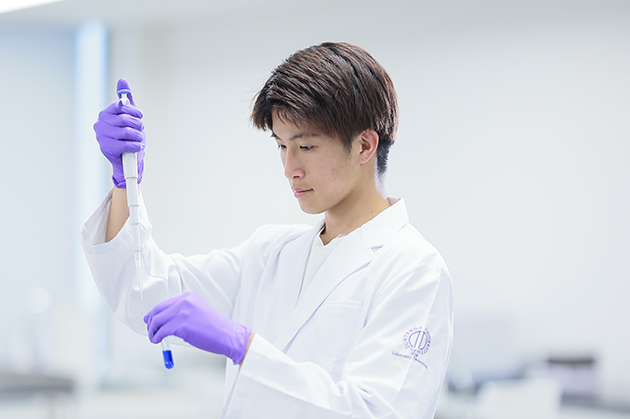
Job Opportunities
Experts in Testing and Analysis for Quickly Detecting IllnessesClinical laboratory technicians collect specimens such as blood samples, conduct physiological tests, and perform analytical work using specimens. Attention has been drawn to the strenuous efforts being put into PCR tests for COVID-19 being done in the field. Technicians are necessary in a wide range of fields due to their work relating to the early detection and treatment of illnesses.
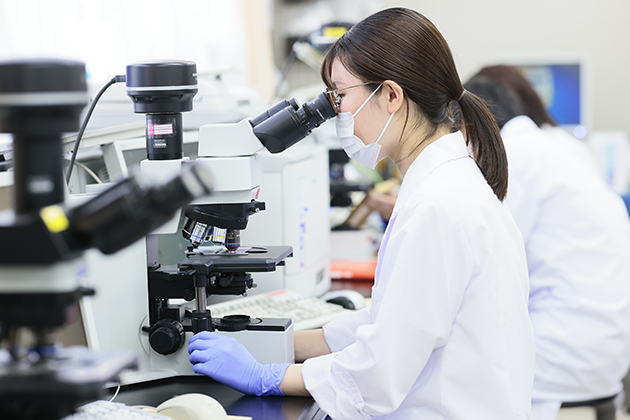
A Job Required by the Times
Early Detection and Preventive medicine, Fields that are Only ExpandingBy understanding the tests in various clinical settings and connecting the results to early detection and treatment of illnesses, lives can be saved. In Japan, which faces a rapidly aging society, preventive medicine needs to become more prevalent, such as by extending healthy life expectancy and tackling illnesses before they become an issue, and the expectations and opportunities for clinical laboratory technicians are continuing to expand.
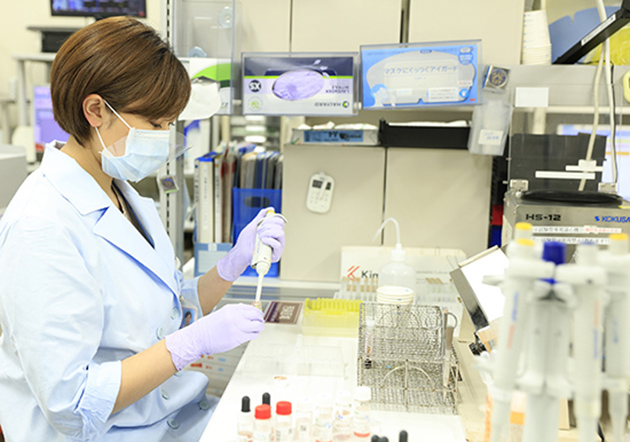
Human Resource Development
Become a Communicative Testing ProfessionalThe work of a clinical laboratory technician requires cooperation especially with doctors and nurses. There are also tests such as blood sampling and ultrasound examinations where you need to interact with the patient directly. As such, clinical laboratory technicians with high level communication skills are required in the medical field. A single word or smile from you can ease a patient’s anxiety.
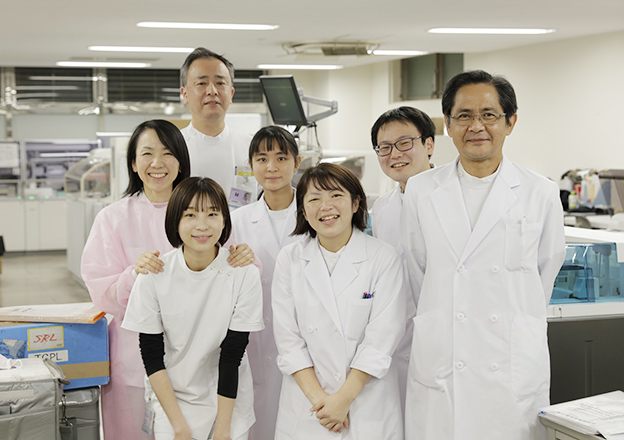
Curriculum
Education for Developing Practical Skills Linked to Medical PracticeIn their first year, students acquire a basic knowledge of culture and medicine, gradually gaining specialized knowledge and practical skills. The curriculum is designed to deepen understanding in stages over the course of four years. It is also possible to acquire sufficient medical education through cooperation with other medical departments such as the Faculty of Medicine. Those who have trouble with math or physics also need not worry, as we will support you with basic subjects after enrollment.
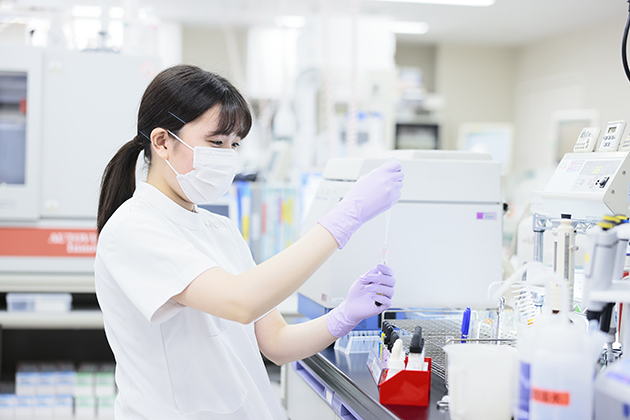
Strengths of Learning at Juntendo
Professors with Extensive Clinical Experience and Research CapabilitiesClasses are small. Practical skills in the medical field are acquired through detailed guidance tailored to each student. The campus is fully equipped with facilities for learning cutting-edge medical care, such as a physiological function laboratory, and classes are taught by professors with extensive clinical experience and research capabilities. We also wholly support students wishing to enter graduate school in the future.
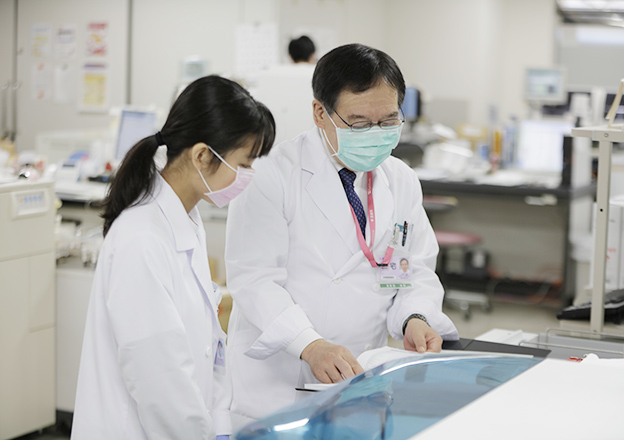
Educational Environment
A Full Range of Facilities and Testing Equipment Actually Used in the Medical FieldIn addition to a full range of medical and testing equipment, the campus is fully equipped with facilities for learning cutting-edge medical care, including a physiological function laboratory and training rooms for clinical testing. Since we have a variety of items that are actually used in medical institutions, you will be able to acquire practical skills that can be used in the field through classes and practical training.
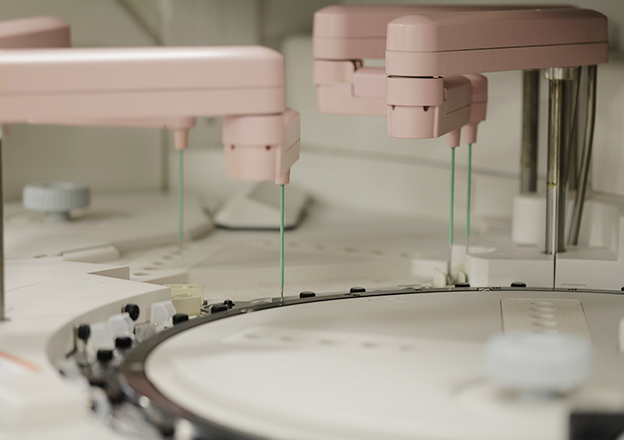
Department of Clinical Engineering
In order to solve social problems such as the aging of society, technology is evolving day by day and medical care is becoming more advanced. We are now in an era where engineers protect lives.
A clinical engineer is an engineer of life.
The more advanced medical devices become, the more specialization is required.
A clinical engineer is an engineer of life.
The more advanced medical devices become, the more specialization is required.
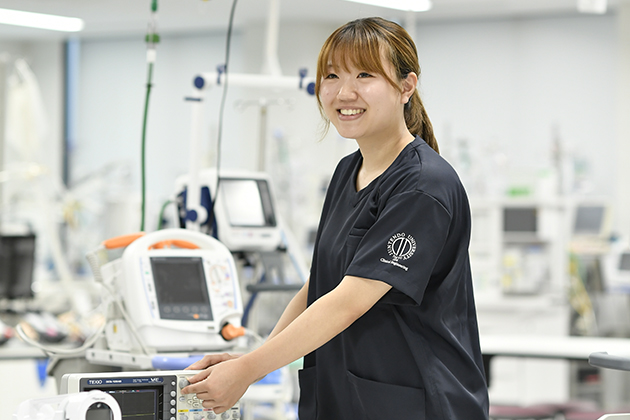
Job Opportunities
Medical Device Specialists with Knowledge and Skills in Both the Medical and Engineering FieldsClinical engineers are medical technicians who operate and maintain high-tech medical devices such as dialysis machines, ventilators, and extracorporeal circulation systems (including ECMO). They are expected to play an active role in a wide range of fields, from life-sustaining support in operating rooms and intensive care units (ICUs) to research into future medical devices and joint development with manufacturers.
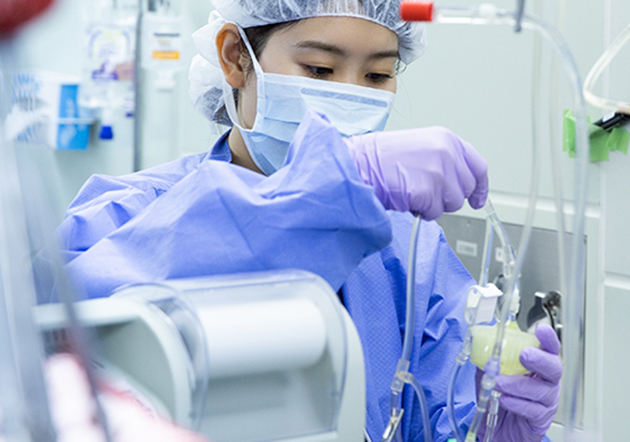
A Job Required by the Times
The More High-Tech Medical Devices Become, the Higher the Expectations of Clinical EngineersHigh-tech medical devices capture a lot of patient data. Moving forward, digital science utilizing AI and other technologies will continue to advance, and it is expected that personalized treatment methods will be proposed for each patient. Clinical engineers may be the first to recognize these treatment methods.
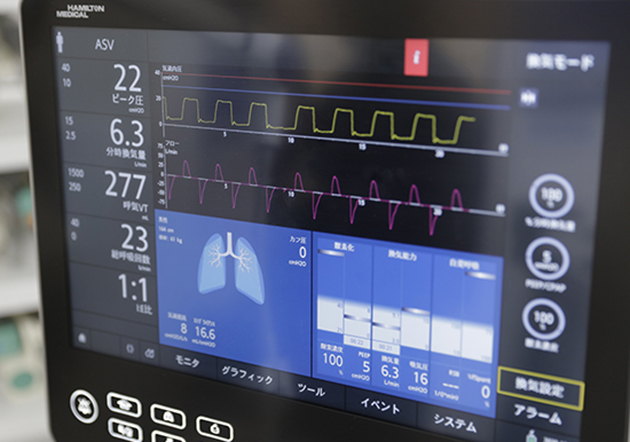
Human Resource Development
Become a Clinical Engineer Who Can Play an Active Role in Team MedicineThe medical field is team medical. Depending on a patient’s condition, highly specialized medical professionals such as doctors, nurses, and clinical engineers gather and work together to provide treatment. This requires reliable information sharing and communication among medical professionals. We train clinical engineers with the necessary expertise and communication skills.
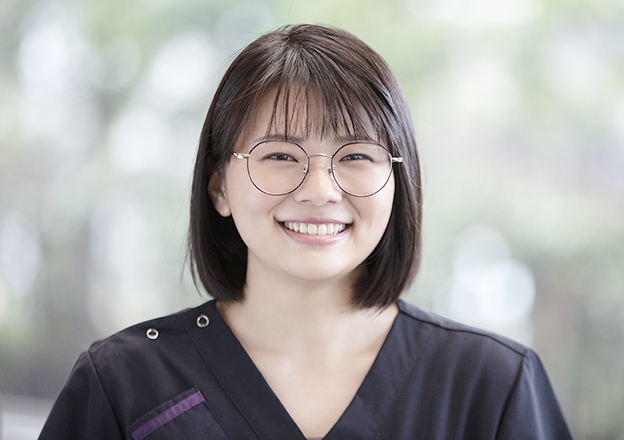
Curriculum
Learn a Proper Balance of “Medicine” and “Engineering”The curriculum of the Department of Clinical Engineering ensures students learn a good balance of both medical and engineering subjects. For medical subjects, it is possible to acquire sufficient medical education through cooperation with other medical departments. In the engineering field, faculty members with experience and research accomplishments in the fields of medical engineering and artificial organs are available to help students acquire the necessary engineering skills.
We also have basic subjects such as math and physics. Those who have trouble with such subjects needn’t worry, as we offer support after enrollment.
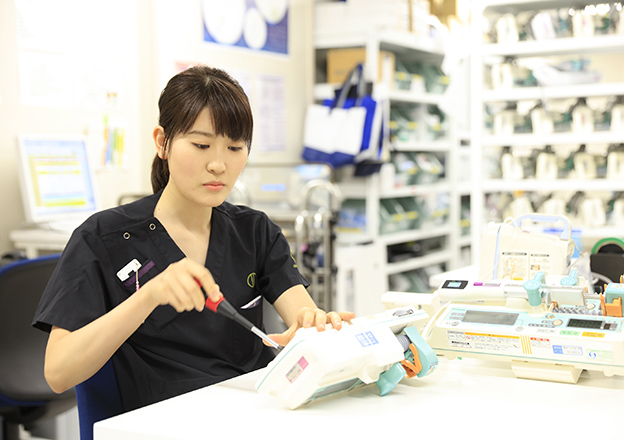
Strengths of Learning at Juntendo
Professors with Extensive Clinical ExperienceReceive Clinical Training at Major Hospitals in the Tokyo Metropolitan Area in Addition to Our University Hospitals
We not only have faculty with extensive clinical experience and research capabilities, but are also fully equipped with facilities for learning cutting-edge medical treatments and medical equipment actually used in the medical field. Additionally, classes are small. Practical skills in the medical field are acquired through detailed guidance tailored to each student. We also wholly support students wishing to enter graduate school in the future.
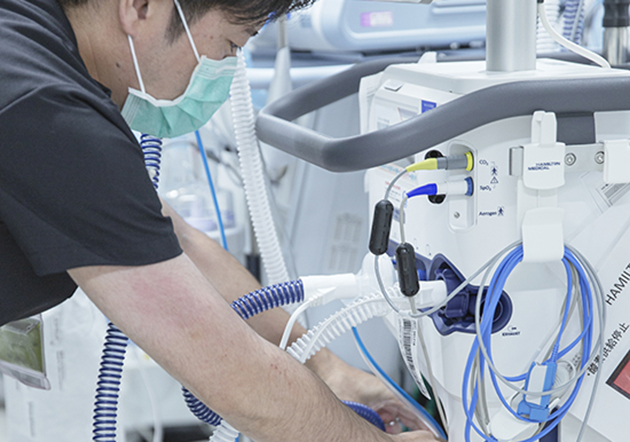
A New and Well-Equipped Urayasu-Hinode Campus
Established in April 2022, the Urayasu Campus houses the Faculties of Health Science, Health Data Science, and Pharmacy. With state-of-the-art education and research facilities, the campus offers an enriching environment for study and campus life.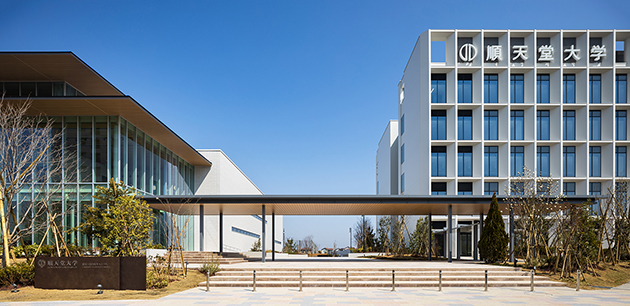
Voices
Student, Department of Clinical Laboratory Technology
Transforming empathy into a clinical laboratory careerI wanted to ease the anxiety of my family when they became ill, and that inspired me to pursue a career as a clinical laboratory technologist. I chose Juntendo University because I was drawn to its well-rounded educational environment, including small-group classes taught by professors with extensive clinical experience and excellent facilities. I am devoting myself to my studies so that I can come closer to becoming the kind of clinical laboratory technologist I aspire to be, firmly building my knowledge from the basic structure of the human body to the specialized expertise required in the field.

Student, Department of Clinical Engineering
Building expertise with proactive learningI chose Juntendo University because I was attracted by its well-balanced curriculum that integrates medicine and engineering, as well as its overseas training programs. Even complex topics that are difficult to fully grasp through lectures alone can be mastered by learning through experiments, which ensures the solid acquisition of specialized knowledge. I was particularly interested in the medical electrical engineering classes, where I could study the mechanisms and principles of medical devices. At present, I am working to improve my GPA by proactively deepening my learning through preparation, review, and early test preparation.
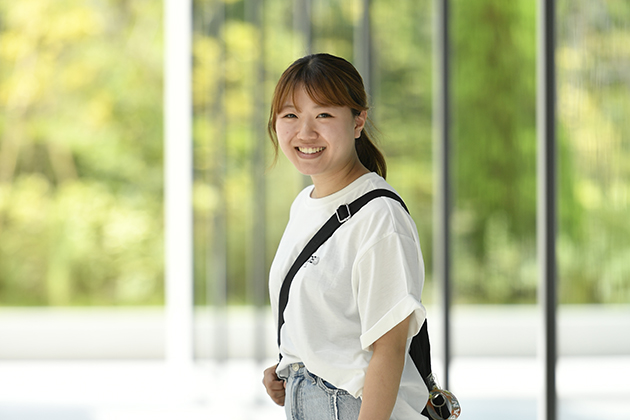
Student, Department of Clinical Laboratory Technology
Learning from experts, preparing to serve societyThe appeal of Juntendo University lies in the fact that professors—experts in their respective fields with extensive clinical experience—teach specialized knowledge in an accessible way, often sharing real-world experiences from the field. They also answer questions with great care, allowing us to continue our studies without leaving any doubts unresolved. In the future, I hope to contribute to society as a clinical laboratory technologist. With this goal in mind, I also plan to take on the challenge of the Level 2 Electrocardiogram Certification.
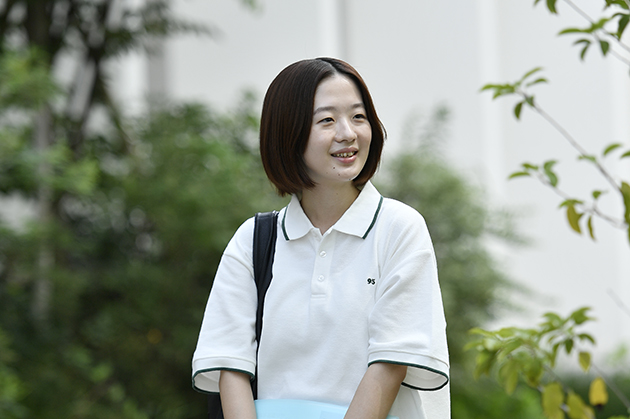
Student, Department of Clinical Engineering
Deepening knowledge to shape clinical engineering futureWhen I was in high school and aspiring to become a clinical engineer, I learned that Juntendo University had newly established the Department of Clinical Engineering, and I decided to apply. Among the classes, I find pathophysiology particularly fascinating. As I study the causes of various diseases, I have begun to see more clearly which areas I am most interested in. Looking beyond exams to my future career, I aim to deepen my understanding of both diseases and medical devices while also working to improve my GPA, a key measure of academic performance.
